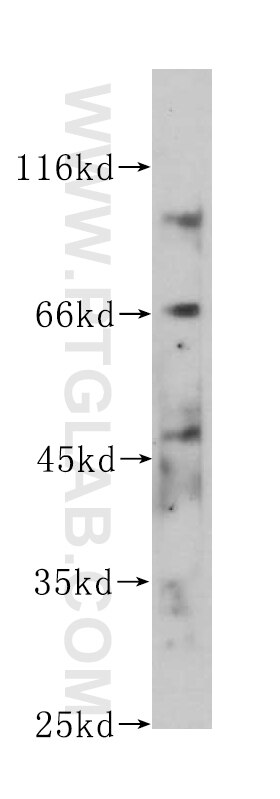Anticorps Monoclonal anti-Granulin
Granulin Monoclonal Antibody for WB,ELISA
Hôte / Isotype
Mouse / IgG1
Réactivité testée
Humain
Applications
WB,ELISA
Conjugaison
Non conjugué
CloneNo.
5B8B7
N° de cat : 60037-2-Ig
Synonymes
Galerie de données de validation
Applications testées
| Résultats positifs en WB | cellules HeLa |
Dilution recommandée
| Application | Dilution |
|---|---|
| Western Blot (WB) | WB : 1:200-1:1000 |
| It is recommended that this reagent should be titrated in each testing system to obtain optimal results. | |
| Sample-dependent, check data in validation data gallery | |
Informations sur le produit
60037-2-Ig cible Granulin dans les applications de WB,ELISA et montre une réactivité avec des échantillons Humain
| Réactivité | Humain |
| Hôte / Isotype | Mouse / IgG1 |
| Clonalité | Monoclonal |
| Type | Anticorps |
| Immunogène | Granulin Protéine recombinante Ag0010 |
| Nom complet | granulin |
| Masse moléculaire calculée | 64 kDa |
| Poids moléculaire observé | 64-68 kDa |
| Numéro d’acquisition GenBank | BC010577 |
| Symbole du gène | GRN |
| Identification du gène (NCBI) | 2896 |
| Conjugaison | Non conjugué |
| Forme | Liquide |
| Méthode de purification | Précipitation de l'acide caprylique/du sulfate d'ammonium |
| Tampon de stockage | PBS avec azoture de sodium à 0,02 % et glycérol à 50 % pH 7,3 |
| Conditions de stockage | Stocker à -20°C. Stable pendant un an après l'expédition. L'aliquotage n'est pas nécessaire pour le stockage à -20oC Les 20ul contiennent 0,1% de BSA. |
Informations générales
GRN, also known as PGRN or PCDGF, is a cysteine-rich protein of 68.5 kDa that is typically secreted into a highly glycosylated 88 kDa form. PGRN is a unique growth factor that plays an important role in cutaneous wound healing. It has an anti-inflammatory effect and promotes cell proliferation. When PCDGF is degraded to several 6-25 kDa fragments, called granulins (GRNs) by neutrophil proteases, a pro-inflammatory reaction occurs. PGRN is widely expressed, particularly in epithelial cells, immune cells, neurons, and chondrocytes. High levels of PGRN expression have been reported in human cancers, and its expression is closely correlated with the development and metastasis of several cancers. The recent discovery that mutations in the gene encoding for pro-granulin (GRN) cause frontotemporal lobar degeneration (FTLD), and other neurodegenerative diseases leading to dementia, has brought renewed interest in progranulin and its functions in the central nervous system.
Protocole
| Product Specific Protocols | |
|---|---|
| WB protocol for Granulin antibody 60037-2-Ig | Download protocol |
| Standard Protocols | |
|---|---|
| Click here to view our Standard Protocols |


